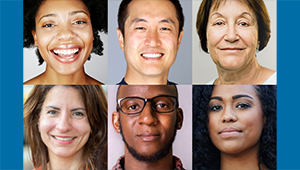Kaiser Permanente Research Bank: Why you should join
Kaiser Permanente pathologist Dr. Reva Ricketts-Loriaux urges all members to donate blood samples to add to scientific knowledge. Go to kp.org/research bank to learn more.
All Washington members are invited to be part of research that could improve health for millions
Dr. Reva Ricketts-Loriaux, a pathologist at Kaiser Permanente Northwest, spends most her time examining tissue through a microscope, looking for changes in cells that might indicate diseases like skin, breast, or cervical cancer.
“In my clinical work, I make diagnoses that help individual patients, but I’m interested in helping larger groups,” she says. “And my work with the Kaiser Permanente Research Bank allows me to do that.”
Dr. Ricketts-Loriaux sits on the Research Bank’s Access Review Committee, which determines how researchers can use the bank’s blood samples and medical information.
“We take this responsibility very seriously,” she says. “We want to make sure that our members’ samples and medical information are used carefully and responsibly. We want to make sure that the research that is done is practical and meaningful for our patients. “
Researchers will use the samples to answer important health care questions. For example:
- Do certain types of cancer increase the risk for other cancers?
- How does exposure to household chemicals during pregnancy affect a baby’s development?
- And how can we develop new drugs or new treatments for conditions like asthma, cancer, and heart disease?
“This is a completely altruistic endeavor,” Dr. Ricketts-Loriaux explains. The bank does not give individualized information back to the patients regarding their genetics or disease risks. But the knowledge generated may help others.
The Kaiser Permanente Research Bank aims to recruit 500,000 members, including pregnant women, people with cancer, and members from diverse racial and ethnic backgrounds.
Kaiser Permanente Washington joined the bank last year.
“Overall, we just want to get a large, diverse population, says Dr. Ricketts-Loriaux. And unfortunately, in biobanks currently, you do not have a good representation of women and minorities.”
She adds, “Not everybody can be a scientist or researcher, but everybody can add to scientific knowledge simply by donating their blood.
To find out more, go to KP.org/research bank.
news

Washington state members begin joining the KP research biobank
KPWHRI launches a phone-based recruitment pilot project in May. Outreach to diverse populations is key.



